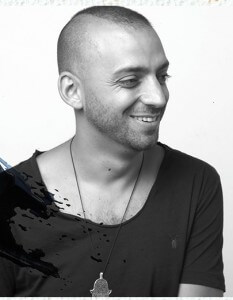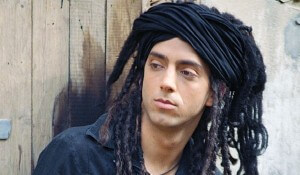
Oh-so-hip Israeli musician Idan Raichel, known for wearing his hair in dreads (until he recently shaved his head) and incorporating Arab and African music and musicians into his act, took to Instagram the other day to suggest that a notorious Israeli interrogator accused of sodomizing a detainee with a baton deserves a “medal of honor,” according to a new report by journalist Ben White.

The object of Raichel’s admiration was Doron Zahavi, a former interrogator for the Israeli military (now an adviser on Arab affairs to the commander of the Jerusalem District Police), who last week came forward and identified himself publicly as the officer previously known in the Israeli media as “Captain George.” (Tikun Olam bloggger Richard Silverstein actually revealed the officer’s real name in 2010, but the Israeli press ignored his scoop.) Zahavi first came to public attention, under his nom de torture, a decade ago, when Mustafa Dirani, a Lebanese citizen who had been abducted from his home by IDF commandos in 1994 and brought to Israel for interrogation, testified in an Israeli court that “George” and soldiers under his command had abused him in a variety of ways, including keeping him naked around the clock for weeks, repeatedly threatening him with rape, and the baton sodomy.

Raichel, an Ashkenazi Jew born in Israel in 1977, is a singer-songwriter, keyboardist, and producer of what he calls “global fusion” music. His group, which he self-effacingly calls the Idan Raichel Project, includes up to 85 other musicians, among them Yemenis, Ethiopians, and South Africans. Their records include tracks in numerous languages, including Arabic, Spanish, Cape Verdean Creole, and Swahili as well as Hebrew. “Quarter to Six,” their latest CD, features guest appearances by Portuguese fado star Ana Moura, German counter-tenor Andreas Scholl, Colombian jazz-folk artist Marta Gómez, young Malian master Vieux Farka Touré, and Palestinian-Israeli singer Mira Awad.
In recent years Raichel has teamed up with Touré to form the Touré-Raichel Collective, which produced a critically acclaimed album called “The Tel Aviv Session” and a hugely successful North American tour. He also collaborates often with the American black singer who goes by the name India.Arie in a project they call Open Door. During a U.S. tour in 2009, he told an interviewer in Seattle that his goal was to promote “tolerance and multiculturalism,” including introducing Israelis who otherwise homogenize all Arabs as “Hamas” to such wonders as Mahmoud Darwish, Fairuz, and Umm Kulthum.
All this broadmindedness has brought him enormous acclaim, not only in the world of music but also from political leaders. According to the bio on the Raichel Project website, Shimon Peres, the President of Israel, asked him in 2012 to compose music for a poem Peres had written in dedication to Israel’s Ethiopian community (the Jewish part of it, no doubt), and when Barack Obama visited Israel last March, he invited Raichel to perform at a private concert. In 2012 the Israeli Foreign Ministry sponsored him on a tour of Africa. Dr. Andy David, former Israeli consul general for the Pacific Northwest, called him “maybe the best ambassador that Israel has through his music and inclusiveness.”

Even Silverstein, who has few illusions left about Israeli society, wrote an admiring profile focusing on the radicalism – by Israeli standards – of Raichel’s multiculturalism.
But that was before he began to make his politics clear. In 2007 he agreed to perform at the 40th-anniversary celebration of Gush Etzion, the Israeli settlement bloc south of Bethlehem, provoking Gush Shalom, the peace group led by veteran Israeli activist Uri Avnery, to denounce him and fellow musicians for “selling their souls to the settlers” and even to call on “Israeli peace seekers” to boycott their performances and CDs. (For now Gush Shalom has removed the statement from its website “to avoid the huge compensation claims for advocating a boycott of the settlements made possible by Israel’s 2011 anti-boycott law.” Meanwhile, its legal challenge to this legislation slowly works its way through the Israeli courts. A copy of the 2007 statement remains available here.)
In 2008 Raichel acknowledged the political objectives of his work, telling an interviewer “We certainly see ourselves as ambassadors of Israel in the world, cultural ambassadors, hasbara ambassadors, also in regards to the political conflict.” He publicly justified Operation Cast Lead and provided an endorsement to a U.S. organization called Thank Israeli Soldiers, which invites donors “to show your gratitude and support to the people who are on the front lines to protect Israel and freedom everywhere” by paying for care packages and “educational and inspirational programs” for IDF soldiers.

In response, supporters of Palestinian rights have in recent years staged protest demonstrations at numerous Raichel performances, including in Seattle in 2009, in Leeds (U.K.) in 2010, in New York (2011 and 2013), and last year in Philadelphia .
Now that Raichel has endorsed the brutality of Captain George, we can only hope that he will face bigger and stronger opposition on his future tours!
In the meantime, more about his hero’s history and philosophy, courtesy of the Israeli press:
In 2000, Dirani sued Israel for damages, charging that he was tortured and raped during the interrogation, after a former colleague of Capt. George’s told Dirani’s Israeli lawyer that the investigator was “brutal” and that he had witnessed him inserting a baton into a suspect’s rectum.
“I saw this with my own eyes,” the colleague, a colonel in the reserves, told attorney Zvi Rish in 1999. “When he put [the baton] into the rectum of a detainee and told him, ‘Go ahead, sit on it.’ He said, ‘Go ahead, sit on the baton, and if you don’t talk, it will go in.’ That’s what I saw.”
The colonel was questioned under caution by the Israel Police in 2007 and retracted some of the allegations.
Capt. George, who served at the time as an officer at Military Intelligence Unit 504 and is now the Arab affairs adviser to the Jerusalem police, questioned Dirani for several weeks. He said he had followed the regulations and his commanders’ directives, but that he had been expelled from the Israel Defense Forces after being accused of violating the law during the interrogation. He also said the army was concealing evidence that would prove his innocence.… a videotape from Dirani’s interrogation showing that it was the unit commander who had interrogated Dirani while the militia operative was naked.
…
The colonel who worked with Capt. George in Unit 504 said the investigator regularly entered interrogation rooms with a baton, hit the suspect and threatened to insert it into his rectum if he lied or refused to talk. He said in one interrogation, he witnessed Capt. George stripping a suspect naked, forcing him to drink tea or coffee from a used ashtray, and shoving either shaving cream or toothpaste into the suspect’s mouth.
“I was dumbfounded,” the colonel said. “I would be sitting in a room and observing, and he would walk into the interrogation with brutality, dump the suspect off the bench, stomp on him, kick him, threaten him that he will [expletive] him, and if not him, then others will [expletive] him and rape him.”
Now Captain George is paying the price – his commanders have thrown him to the media hounds. He himself doesn’t see any particular problem with his conduct; that’s what everybody does in Unit 504 of the Shin Bet security service, with the knowledge and approval of all the top people. “Do you know how many people have died under interrogation?” he asks, and immediately replies: “They died, they died, and they’ll die in the future too …. Nobody really wants me to get up on the witness stand and tell all.
[L]ast Friday evening, the Channel 2 current affairs program “Ulpan Shishi” aired an interview with “George.”
“When you are in the midst of an interrogation,” George said in the interview, “when it involves hardcore terrorists who understand what we’ll call the laws limiting you, sometimes you need to show them a bit more, so they understand that from your standpoint at least, everything is allowed.”
According to the State, though Dirani was not raped, as he claimed, he was indeed threatened: An IDF soldier testified that the plaintiff instructed him to take off his pants in front of Dirani in order to frighten him. Another soldier gave a similar testimony regarding another detainee.
According to another testimony the plaintiff made handcuffed detainee walk naked in the holding facility’s yard while another officer touched the detainee’s buttocks with a club.
Haaretz Jan. 2, 2014, Gideon Levy: Pity the Poor Interrogator:
In an installment of Channel 2’s investigative journalism program, “Uvda,” which was broadcast in late 2011, video clips of Dirani’s interrogation were screened: Captain George, who says the state besmirched his “good name,” can be seen in those video tapes in an arrogant Israeli pose, his feet on the desk, sitting opposite Dirani, who is in his underpants, hunched over, looking humiliated and frightened. The commander, Col. S., threatens to sodomize Dirani; the soldier who will commit the act of sodomy is on his way. “What a lovely skirt you are wearing, you mother-fucker … just open your legs wide” is the utterance made in the name of the State of Israel when Dirani is forced to stand on a chair, naked, before the watchful eyes of his investigators. At Base 1391, Israel’s version of Guantanamo, this was – and perhaps still is – just a routine questioning session.
According to testimonies that have become public over the years, a chilling picture of Base 1391 emerges: a canister of shaving foam emptied into the interrogated person’s mouth, water mixed with ash that Dirani and other people being investigated were forced to drink from an ashtray, along with the usual repertoire of sleep and food deprivation, beatings, abuse and other acts intended to humiliate the subject. This is how the work was carried out. There are still some people around who defend it. This week, Israel’s singer-philosopher, Idan Raichel, called on Instagram for the IDF to award Zahavi a medal of honor.
A final irony: in 2010, when Zahavi was appointed to his current position as adviser on Arab affairs to the Jerusalem police, a police official told Haaretz that “The adviser must be an accepted and welcome figure in the Arab community, with excellent interpersonal skills – someone they feel they can trust, otherwise he cannot succeed in the job.”


A bit of background to the Mustafa Dirani abduction by Israel. Israeli commandos landed by helicopter at his house in the Bekaaa Valley and at the house of a spiritual leader (sort of a chaplain) of Hizbullah, Cheikh Abdul-Karim Obeid. Both were abducted in the middle of the night along with a neighbour that was visiting one of them and were taken to Israel’s secret concentration camp, Facility 1391 a torture camp so secret that the Israeli Minister of Justice was not aware of its existence. The camp was run by the Military Intelligence Unit 504 mentioned in Henry’s article above. The 2 Lebanese men were abducted to be used as bargaining chips by Israel to get information from Hizbullah about the Israeli missing aviator, Ron Arad. They were held and tortured for 10 years until finally released in a prisoner swap with Hizbullah in 1994.
The story of the secret torture facility in Israel that Haaretz broke:
http://web.archive.org/web/20071121052741/http://www.haaretz.com/hasen/pages/ShArt.jhtml?itemNo=331637
Another word for all this Idan-dominated “multiculturalism” would be large-scale cultural appropriation/exploitation, no?
Raichel posted a photo of a newspaper report titled “Captain George Revealed”, adding the following comment (in Hebrew):
In response to a comment expressing some reservations about his position, Raichel answers:
Welcome to the Idan Raichel Project: Peace, love, tolerance and … torture.
RE: “Tikun Olam bloggger Richard Silverstein actually revealed the officer’s real name in 2010, but the Israeli press ignored his scoop.” ~ Norr
MY COMMENT: I know Henry Norr well enough to be certain that he by no means meant to diminish Richard Silverstein by referring to him as a “blogger”, but I must take this opportunity to say that I consider Mr. Silverstein to be much more of a journalist than the vast majority of supposed journalists working for what Ray McGovern likes to call the ‘Fawning Corporate Media’ (FCM)!
Q: …the people who are on the front lines to protect Israel and freedom everywhere…
R: …my left pinky toe is as much a Muslim as Russian born Abe Foxman is a semite…
Yeah, both lines make as much sense now…